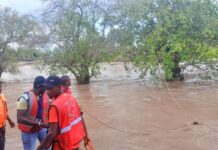Lamu, KENYA: Mpeketoni residents and the environs are a worried lot following the drying up of Lake Kenyatta in Lamu due to the ongoing drought.
Water volumes at the lake which is depended upon by over 60,000 residents of Mpeketoni and neighboring places have dropped drastically from a normal 12 meters to 1.5 with other sections of the lake having even lower water volumes.
There are fears of a crisis since the lake is now under intense use by humans, wildlife and fishermen.
There are also health concerns due to increased contamination caused by increased deaths of hippos, buffaloes, snails and other animals.
Residents have also expressed worry of a possible outbreak of illnesses related to use of dirty water and dirty environments.
The lake which was named after the founder of the nation Mzee Jomi Kenyatta has been a major area of concern since the drought began and especially following the deaths of more than 20 hippos at the lake early this year.
The remaining muddy puddles of water at the lake have turned salty adding to the frustrations of residents.
According to the chairperson of the Lake Kenyatta Conservation Trust Ayub Kamau,most parts of the lake have dried up.
Dependence on the lake has however risen from at least 60,000 to over 100,000 people and over 200,000 heads of livestock due to the drought,a situation that has clearly strained the capability of the lake.
Intense human activity including fishing and sand harvesting have also played an integral part in the ever dropping water levels at the lake.
“We need environmentalists and health experts to come and help us out. We need to save this lake;at the moment humans,wild and domestic animals are all reliant on the lake.You can imagine the mess combined with daily carcasses of fish,hippos and other animals that die after getting stuck in the mud when they come for a drink,”said Kamau.
There are concerns that the lake might completely die out without prompt interventions to save it.
“Over 200,000 livestock are brought here for a drink daily.This is the only remaining source of water after all other lakes,rivers and swamps dried up in Lamu and neighboring Tana River and Garissa,” said Kamau.
World Wide Fund for nature Kenya Coast Programmes manager Kiunga Kareko has appealed to all stakeholders to come together and find ways of rescuing the lake.













